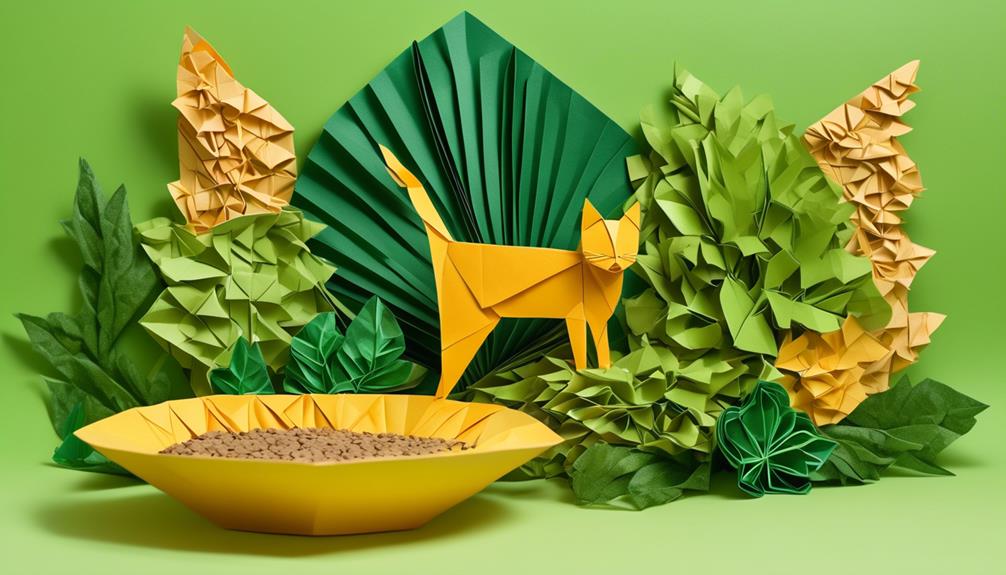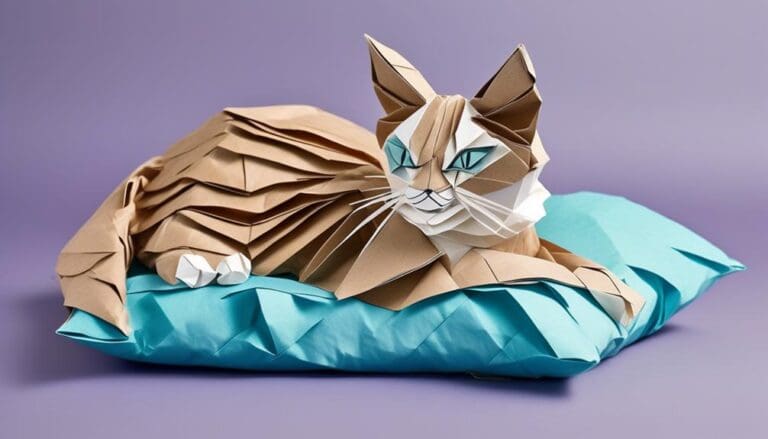If your elderly cat is constipated, it’s concerning, but there are solutions to help them.
Considering high-fiber foods for your cat’s diet is a gentle, yet effective way to ease their discomfort and promote a healthier digestive rhythm. Fiber is known to work wonders by adding the necessary bulk to their stool and facilitating smoother transitions.
To add more fiber to your senior cat’s diet without causing issues, it’s important to carefully choose cat foods and supplements that support digestive health, considering their sensitive systems.
Let’s look at how choosing high-fiber foods can benefit your pet’s health and comfort, especially as they age. We’ll discuss what this means for your beloved animal and how you can make these dietary changes to improve their well-being.
Key Takeaways
- Feline constipation can cause discomfort and stress in senior cats.
- High-fiber diets can help regulate the digestive system and make stool easier to pass.
- Natural fiber-rich foods like canned pumpkin and cooked carrots are beneficial for senior cats.
- Gradually increasing fiber intake in a cat’s diet can alleviate constipation and promote regular bowel movements.
Understanding feline Constipation
Addressing feline constipation, it’s essential to recognize that this common ailment can cause your senior cat significant discomfort and stress. As a caregiver, you’re attuned to the subtle shifts in their well-being, and noticing signs of constipation can be both concerning and a call to gentle action. Your beloved cat relies on you to interpret these signs: from their less frequent visits to the litter box to their strained demeanor that replaces the usual relaxed posture.
Understanding feline constipation involves more than noting changes in bowel movements. It’s about empathizing with the discomfort that may lead them to shy away from cuddles or to rest more than play. This is where you can make a profound difference. Adding more fiber to their diet can improve their comfort by easing their digestive issues.
Fibers benefit cats with constipation by helping to regulate their digestive system, creating stool that’s easier to pass. This can reduce the physical strain and emotional distress they experience. By serving your senior cat a high-fiber diet, you’re nurturing them with every bite, restoring balance and peace to their vulnerable systems.
Benefits of High-Fiber Diets
Incorporating high-fiber foods into your senior cat’s diet can offer a multitude of benefits, gently easing their digestive woes and promoting overall gut health. Dietary fiber plays an important role in this improvement. As a loving caretaker, you’re not just providing a meal, but also a remedy that supports their delicate system.
Adding the correct amount of fiber to your pet’s diet can improve their digestive system by helping their intestines move food along, which lowers the chance of constipation. It’s also important to give them more water because it works with the fiber to soften their stools, making bowel movements easier.
For cats wrestling with weight issues or hairballs, high-fiber diets create a sense of fullness, potentially curbing overeating while aiding in the expulsion of ingested hair. And let’s not forget about the invisible helpers – beneficial gut bacteria, which thrive on the nutrients that fiber provides.
Always remember to consult with your veterinarian before making any dietary changes. They can guide you to a diet tailored for your senior cat’s specific needs, ensuring they get the tender care they deserve in their golden years.
Fiber Sources for Senior Cats
You know the discomfort your senior cat faces with constipation, and you’re ready to ease their struggle with the right kind of fiber.
Let’s investigate high-fiber natural foods and supplements that can improve your cat’s digestion.
You’ll see that with careful adjustments and close monitoring, you can greatly improve your beloved cat’s quality of life.
Natural Fiber-rich Foods
To support your senior cat’s digestive health, consider introducing natural fiber-rich foods that are both gentle on their system and effective in alleviating constipation. These dietary fiber sources can soothe your beloved cat’s digestion and encourage regular bowel movements.
Natural fiber-rich foods include options like canned pumpkin or cooked carrots, which can be easily mixed into their meals. When you take care of your elderly pet, it’s important to ensure they have a balanced diet that includes enough fiber.
Always consult with your vet to tailor the right amount for your cat’s unique needs. By doing so, you’re not only easing their discomfort but also nurturing their overall well-being with the kindness they deserve.
While natural foods rich in fiber can work wonders for your senior cat’s digestion, there are also supplemental fiber options that can gently ease their constipation woes. If you’re seeking to provide the utmost care, consider these tender touches of support:
- Psyllium Husk: This gentle fiber supplement can be mixed into your cat’s food, promoting a soft, manageable stool with its soluble fiber.
- Wheat Dextrin: A sprinkle of this soluble type of fiber over their favorite meal can encourage regular bowel movements without upsetting their sensitive system.
- Canned Pumpkin: Not only a natural source of fiber, but this homely addition can soothe your cat’s digestive tract, offering comfort alongside effective relief.
These fiber sources can help your beloved pet live comfortably in their old age.
Fiber’s Digestive Benefits
Exploring beyond supplemental fibers like psyllium husk and canned pumpkin, let’s uncover how the right balance of dietary fiber can transform your senior cat’s digestive health, nurturing their system for optimal well-being. The fiber’s digestive benefits are profound, as soluble fiber gently slows stomach emptying, enhancing nutrient uptake. Meanwhile, insoluble fiber lovingly increases stool bulk, easing constipation in cats, and helps manage those pesky hairballs.
Fiber fosters the growth of friendly gut flora, contributing to a harmonious digestive environment. By choosing high-fiber foods, you’re not only comforting your cat’s tummy but also supporting their overall health.
| Fiber Type | Benefits | Good for Senior Cats? |
|---|---|---|
| Soluble | Slows stomach emptying, improves nutrient absorption | Yes |
| Insoluble | Increases stool volume/frequency | Yes |
| Both Types | Promotes gut bacteria, regulates blood sugar/cholesterol | Yes |
| Insoluble | Helps with hairball issues | Yes |
| Soluble/Insoluble | Aids in weight management | Yes |
Managing Constipation Through Diet
You know how distressing it can be to see your beloved senior cat struggle with constipation.
A careful tweak in their diet, focusing on dietary fiber’s vital role, can gently restore the rhythm of their digestive health.
Dietary Fiber’s Role
Understanding the role of dietary fiber can be a game-changer in managing your senior cat’s constipation, offering a gentle and effective way to promote regular bowel movements. Fiber diets tailored to your beloved cat’s needs can alleviate discomfort and restore the joy of their golden years.
Consider these heartfelt benefits of dietary fiber’s role:
- Comfort and Relief: Gradually increasing your cat’s intake of fiber helps ease their struggle, making each day brighter and more comfortable.
- A Nurturing Touch: By carefully monitoring and adjusting fiber levels, you’re providing a tender, personalized care that speaks volumes of your devotion.
- Enhanced Well-being: Coupled with increasing your cat’s water intake, a balanced fiber diet supports their overall health, ensuring more precious moments together.
Your attentive care truly makes a difference in their lives.
Senior Cats’ Digestive Health
As your senior cat enters their twilight years, managing their digestive health through diet becomes a cornerstone of keeping them comfortable and content. Constipation can be a troubling issue for senior cats, but incorporating the right amount of fiber into their diet can make a significant difference. Here’s a table to help you understand how to manage your cat’s diet better:
| Strategy | Benefit for Senior Cats |
|---|---|
| Canned Food | Increases water intake to soften stool |
| High Fiber Diet | Reduces weight and bulks up stool |
| Highly Digestible Diets | Improves gastrointestinal motility |
| Insoluble & Soluble Fibers | Helps manage gastrointestinal motility disorders |
| Veterinary Consultation | Tailors treatment for underlying causes |
Adjusting Fiber Intake Safely
When helping your senior cat overcome constipation, it’s important to start with a modest amount of fiber and gradually increase it, carefully observing their reaction to ensure their comfort and well-being. Dietary management for chronic constipation can be a delicate balance, but with love and attention, you can make a significant difference in their quality of life.
To adjust your cat’s fiber intake safely, consider the following steps:
- Begin with a small portion of high-fiber food, incorporating both soluble and insoluble fiber. This helps create a gentle environment in their digestive system, fostering the relief they so dearly need.
- Monitor your cat’s response daily. Look for signs of improved regularity and less strain during bowel movements. If you notice any discomfort, it may be necessary to alter the fiber dosage or type.
- Consult with your veterinarian before making any major changes to their diet. Their expertise can guide you to the most suitable and highly digestible diet options tailored to your cat’s unique needs.
Monitoring Cat Health and Diet
To safeguard your senior cat’s health and ensure their diet promotes comfortable digestion, it’s essential to keep a watchful eye on their eating habits and physical condition. Observing your cat’s daily routines, you’ll want to ensure they’re getting enough dietary fiber to help regulate their stool consistency. This can be a gentle yet effective way to ease their discomfort and support their delicate system.
Encourage your cat to increase their water intake; a vital step for those who may normally shun their water bowl. Proper hydration works hand in hand with a high-fiber diet to prevent the distress of constipation. Consider water fountains or adding water to their food as inviting ways to promote drinking.
Regular veterinary check-ups can’t be emphasized enough. They’re key to catching any underlying health issues early and adjusting their diet accordingly. Professional guidance ensures that fiber supplementation is balanced, targeting both insoluble and soluble types to foster a healthy intestinal tract.
Frequently Asked Questions
Is Fiber Good for Constipated Cats?
Yes, fiber is beneficial for constipated cats; it helps soften stools and promotes regular bowel movements. You’ll see them feeling more comfortable and their digestive health improving with the right fiber-rich diet.
What Food Is Good for Senior Cats With Constipation?
You’ll want to provide your senior cat with food that’s high in fiber to help ease their constipation. Moist, canned varieties can also increase hydration, which assists in softening their stool.
Why Does High Fiber Help With Constipation?
High fiber sweeps through your gut like a gentle broom, easing constipation by bulking up stools and promoting a smooth passage, offering relief and comfort to those you care for deeply.
How Do You Treat a Constipated Senior Cat?
To treat your senior cat’s constipation, gently increase their water intake, consider a tailored diet, and encourage light exercise. Always consult your vet for a safe, effective plan tailored to your cat’s needs.




